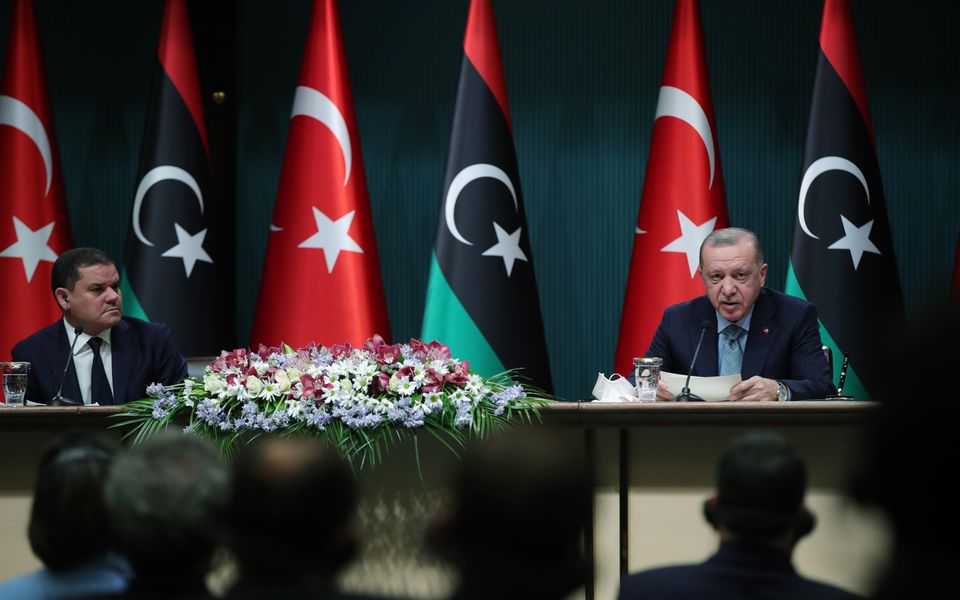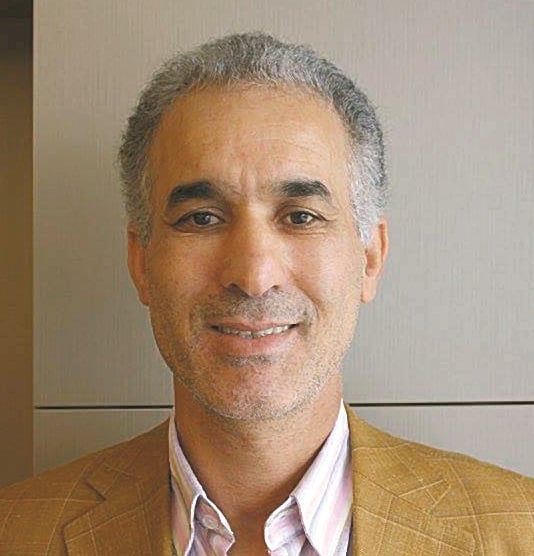
Turkish President Recep Tayyip Erdogan (right) and Libya’s interim prime minister, Abdul Hamid Dbeibah, speak to the press after a meeting at the Presidential Palace in Ankara, on April 12, 2021. [EPA]
Libyan academic and journalist Mustafa Fetouri believes his country is coming under excessive Turkish influence and that Ankara is exploiting its position to expand its reach in Africa.

 Speaking to Kathimerini from the war-torn country’s capital, the award-winning journalist also advises Athens to take advantage of the European Union mechanisms at its disposal to exert influence on Ankara rather than put more pressure on Tripoli.
Speaking to Kathimerini from the war-torn country’s capital, the award-winning journalist also advises Athens to take advantage of the European Union mechanisms at its disposal to exert influence on Ankara rather than put more pressure on Tripoli.
We see the governments of Tripoli and Benghazi increasingly aligning themselves with Turkish foreign policy and accepting its influence. What was the turning point in this relationship, especially for the Haftar (Benghazi) government, which was initially hostile toward Turkey?
Turkey’s presence and penetration in Libya is quite dangerous for Libya’s future and is widely rejected by most Libyans. As for Benghazi, I do not think Haftar and Ankara trust each other, because of Haftar’s relationship with Cairo and personally with President Sisi, who does not really trust Erdogan.
What we are seeing between Haftar and Ankara is really transactional in nature and is unlikely to last long. What Haftar wants is very simple: to control the entire country and become president. Given that this is not happening and does not seem likely to happen in the near future, mainly due to Turkish influence in western Libya, his relations with Ankara seem to be improving, but not to the extent that you will see a fundamental change on either side.
You mentioned that Turkey poses a threat to Libya and its people. Where does this concern stem from?
First of all, Turkey has very high ambitions for the region. Secondly, most of these ambitions are based on ideological foundations deeply rooted in the Islamic movement, the Muslim Brotherhood, where essentially (Turkey) considers itself the leader. Because of this, and because of Erdogan’s enormous political ambitions, Turkish policy has expanded beyond Libya and into Africa. Ankara seeks to use Libya as a base for Turkish policy on the African continent.
The Tripoli government has submitted a formal note verbale to the United Nations objecting the demarcation of the exclusive economic zone between Greece and Egypt and reaffirming its support for the Turkish-Libyan memorandum. Why did the Tripoli government choose this moment to make this move?
Because the Greek side has started to publicize tenders for oil and gas exploration in that area. But what is really happening is that Ankara is behind the Tripoli government. Unfortunately, the people in the government are not free to do what they think is right. And this is not even in Libya’s interest or in its long-term interest. However, because the government is supported by Ankara and controlled by a very controversial document they signed, whatever move they make is within this framework and in consultation with Ankara. And even if they want to change course now, it is very difficult.
In your opinion, will we see the implementation of the Turkish-Libyan memorandum or will it remain on paper?
It is being implemented to a certain extent, but the issue is the document itself – i.e. the idea behind the document, which is directly linked to Libya’s sovereignty and independence. Why? Because it is directly linked to the security agreement between the two countries. While the “maritime agreement” is merely a “memorandum of understanding” (MoU) – which is completely different from a full agreement – the “security agreement” is a full agreement and has already been certified by the Turkish parliament and registered with the UN. In contrast, in Libya, the agreement has not been ratified because parliament rejects it.
What measures should the Greek government take today to restore and strengthen ties with the Tripoli government?
I think it is quite difficult because of the Turkish factor. If you carefully study the MoU in the maritime area between Ankara and Tripoli, you will find an article that says that Libya is not allowed to negotiate with other countries. Therefore, if the government tries to make any changes to this memorandum and to discuss this with Greece, it can only do so if Ankara agrees. However, we must emphasize again that it has not been ratified by the Libyan side. What Athens can really do is use the EU mechanism at its disposal and put pressure on Ankara first, before putting pressure on the government in Tripoli. Why? Because Ankara is the one pulling the strings.
Recently, we have seen dozens of boats sailing from the coast of Libya to Crete, carrying hundreds of migrants, mainly from Sudan. The Greek government recently suspended asylum procedures. Do you believe that migration is being used as a means of pressure to secure European funding?
There has been a lot of talk, such as that Russian President Vladimir Putin is using his relations with eastern Libya, with Haftar, to exploit the issue of migration, but when it comes to migration, I think Libya is not being treated fairly by its European neighbors, including Greece. It is not Libya that colonized most of Africa for centuries. The problem, therefore, must be sought at its root, and that root is not in Libya.